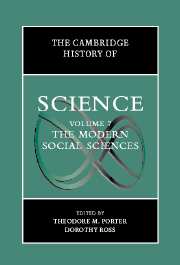Book contents
- Frontmatter
- 1 Introduction: Writing the History of Social Science
- PART I SCIENCES OF THE SOCIAL TO THE LATE NINETEENTH CENTURY
- 2 Genres and Objects of Social Inquiry, From the Enlightenment to 1890
- 3 Social Thought and Natural Science
- 4 Cause, Teleology, and Method
- 5 Utopian Socialism And Social Science
- 6 Social Surveys in the Eighteenth and Nineteenth Centuries
- 7 Scientific Ethnography and Travel, 1750–1850
- 8 History and Historicism
- 9 Bringing the Psyche into Scientific Focus
- 10 Continental Political Economy From the Physiocrats to the Marginal Revolution
- 11 British Economic Theory From Locke To Marshall
- 12 Marx and Marxism
- PART II THE DISCIPLINES IN WESTERN EUROPE AND NORTH AMERICA SINCE ABOUT 1880
- PART III THE INTERNATIONALIZATION OF THE SOCIAL SCIENCES
- PART IV SOCIAL SCIENCE AS DISCOURSE AND PRACTICE IN PUBLIC AND PRIVATE LIFE
- Index
- References
7 - Scientific Ethnography and Travel, 1750–1850
from PART I - SCIENCES OF THE SOCIAL TO THE LATE NINETEENTH CENTURY
Published online by Cambridge University Press: 28 March 2008
- Frontmatter
- 1 Introduction: Writing the History of Social Science
- PART I SCIENCES OF THE SOCIAL TO THE LATE NINETEENTH CENTURY
- 2 Genres and Objects of Social Inquiry, From the Enlightenment to 1890
- 3 Social Thought and Natural Science
- 4 Cause, Teleology, and Method
- 5 Utopian Socialism And Social Science
- 6 Social Surveys in the Eighteenth and Nineteenth Centuries
- 7 Scientific Ethnography and Travel, 1750–1850
- 8 History and Historicism
- 9 Bringing the Psyche into Scientific Focus
- 10 Continental Political Economy From the Physiocrats to the Marginal Revolution
- 11 British Economic Theory From Locke To Marshall
- 12 Marx and Marxism
- PART II THE DISCIPLINES IN WESTERN EUROPE AND NORTH AMERICA SINCE ABOUT 1880
- PART III THE INTERNATIONALIZATION OF THE SOCIAL SCIENCES
- PART IV SOCIAL SCIENCE AS DISCOURSE AND PRACTICE IN PUBLIC AND PRIVATE LIFE
- Index
- References
Summary
The period from the late eighteenth to the mid nineteenth century forms a distinctive era in the history of scientific ethnographic writing. A double framework of technological and political change demarcates its beginnings. On the technological side, advances in mathematics and scientific instrument making facilitated accurate navigation over the thousands of miles of a world sea voyage. On the political side, the era opens with the British victory over the French in the Seven Years’ War (in its North American theater, the French and Indian War), which was ratified by the Treaty of Paris, signed in 1763. This conclusion to one contest set off a new round of competition between the two great powers, who now played out their rivalry in the vast, hitherto imperfectly charted expanse of the Pacific.
State-sponsored French and British voyages soon set out to scour the far side of the globe for layover stations on the journey to Asia. Louis Antoine de Bougainville (1729–1811), a mathematical prodigy who had served Montcalm’s expedition during the disastrous concluding phase of the struggle for North American hegemony, led a world voyage from 1766 to 1769. On the British side, James Cook (1728–1779), who had distinguished himself as a surveyor-hydographer in Newfoundland, led three scientific voyages around the world from 1768 to 1771, from 1772 to 1775, and from 1776 until his death in Hawaii. These and other “scientific voyages” of the late eighteenth century served imperial aims by providing accurate charting of island locations and coastlines, one of the most remarkable achievements of the officers and scientists who risked their lives on wind-driven odysseys to the ends of the earth.
- Type
- Chapter
- Information
- The Cambridge History of Science , pp. 100 - 112Publisher: Cambridge University PressPrint publication year: 2003
References
- 3
- Cited by

